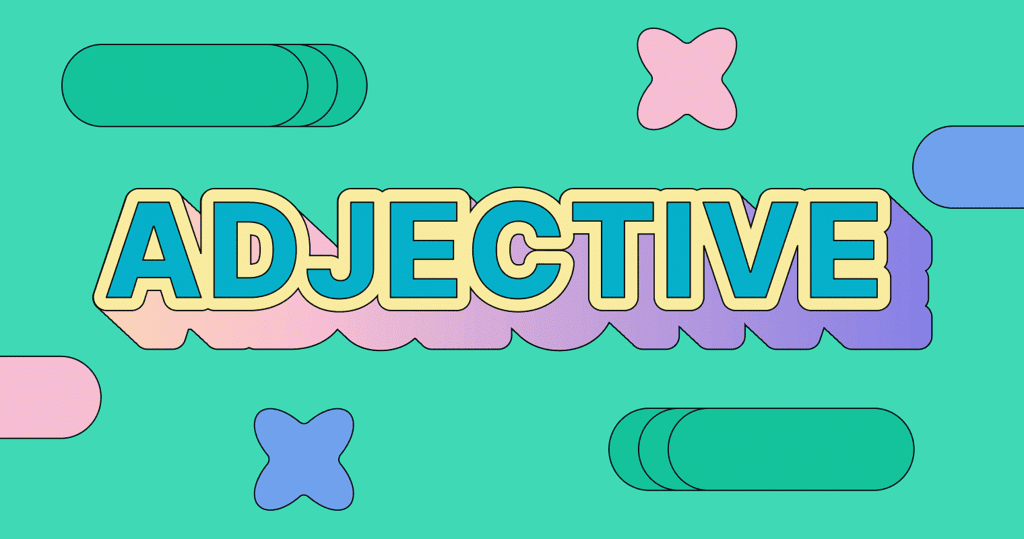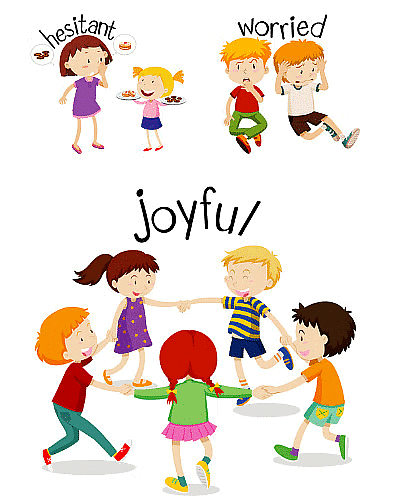Class 1 Exam > Class 1 Notes > English Grammar for Junior Classes > Worksheet: Adjectives - 2
Worksheet: Adjectives - 2 | English Grammar for Junior Classes - Class 1 PDF Download

Q1: Fill in the Blanks
(i) The ____________ cat is sleeping.
(ii) She has a ____________ dress.
(iii) The ____________ flower smells nice.
(iv) The ____________ boy is playing.
(v) The ____________ sun is shining.
(vi) I saw ____________ birds in the sky.
(vii) The ____________ apple is juicy.
(viii) It's a ____________ day today.
(ix) My ____________ friend is helpful.
(x) The ____________ car is fast.
Q2: True or False Questions.
(i) True/False: Adjectives describe nouns.
(ii) True/False: "Blue" is an example of an adjective.
(iii) True/False: Adjectives always come before the noun.
(iv) True/False: "Happy" is an adjective that describes a feeling.
(v) True/False: Adjectives are used to ask questions like "Which one?" or "How many?"

Q3: Choose the Odd One Out. Circle the word that doesn't belong.
(i) Big, Small, Table
(ii) Red, Green, Bicycle
(iii) Fast, Slow, Happy
(iv) Round, Square, Cat
(v) Beautiful, Ugly, Sky
(vi) Tall, Short, Elephant
(vii) Sweet, Sour, Carrot
(viii) Old, New, Banana
(ix) Friendly, Angry, Chair
(x) Blue, Yellow, Chair
Q4: Rewrite the Correct Statement. Rewrite the sentence with the correct adjective.
(i) The cat is big.
Corrected: The ____________ cat is big.
(ii) She is nice.
Corrected: She is ____________.
(iii) The book is old.
Corrected: The ____________ book is old.
(iv) The house is small.
Corrected: The ____________ house is small.
(v) The ball is round.
Corrected: The ____________ ball is round.
You can access the solutions to this worksheet here.
The document Worksheet: Adjectives - 2 | English Grammar for Junior Classes - Class 1 is a part of the Class 1 Course English Grammar for Junior Classes.
All you need of Class 1 at this link: Class 1
|
18 videos|189 docs|31 tests
|
FAQs on Worksheet: Adjectives - 2 - English Grammar for Junior Classes - Class 1
| 1. What are adjectives? |  |
Ans. Adjectives are words that describe or modify nouns. They provide additional information about the noun by giving details such as size, color, shape, or quantity. For example, in the sentence "The blue car is fast," the word "blue" is an adjective describing the noun "car."
| 2. How do adjectives function in a sentence? |  |
Ans. Adjectives typically come before the noun they modify. They can also come after linking verbs such as "be" or "seem." For example, in the sentence "She is intelligent," the adjective "intelligent" comes after the linking verb "is" to describe the subject "she."
| 3. Can an adjective be used to compare different things? |  |
Ans. Yes, adjectives can be used to compare different things. There are three degrees of comparison: positive, comparative, and superlative. The positive degree is used to describe one thing, while the comparative degree is used to compare two things, and the superlative degree is used to compare more than two things. For example, "bright" is the positive form, "brighter" is the comparative form, and "brightest" is the superlative form.
| 4. Are there any exceptions or irregularities in the formation of comparative and superlative adjectives? |  |
Ans. Yes, there are some exceptions and irregularities in the formation of comparative and superlative adjectives. Some adjectives have irregular forms, such as "good" (comparative: better, superlative: best) and "bad" (comparative: worse, superlative: worst). Additionally, some adjectives use the words "more" and "most" instead of adding "-er" or "-est" to form the comparative and superlative degrees. Examples include "beautiful" (comparative: more beautiful, superlative: most beautiful) and "intelligent" (comparative: more intelligent, superlative: most intelligent).
| 5. Can an adjective be used to modify a pronoun instead of a noun? |  |
Ans. No, adjectives cannot directly modify pronouns. Pronouns already have their own inherent meanings and do not require modification. However, adjectives can be used to modify pronouns indirectly by modifying the noun that the pronoun replaces. For example, in the sentence "She is a kind person," the adjective "kind" modifies the noun "person," and the pronoun "she" replaces the noun.
Related Searches

















